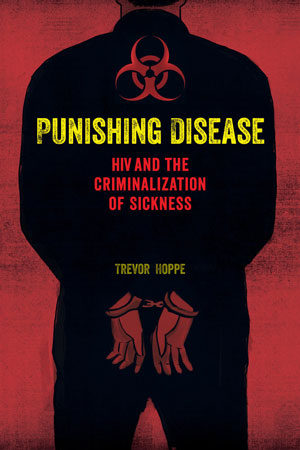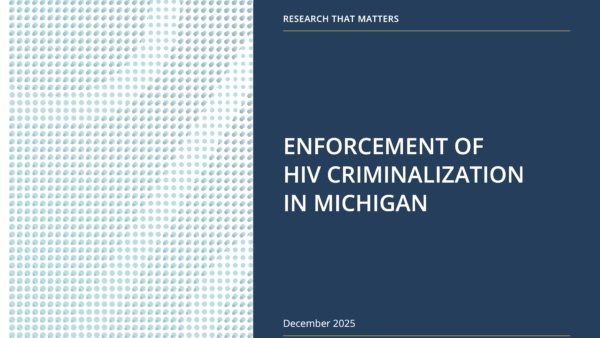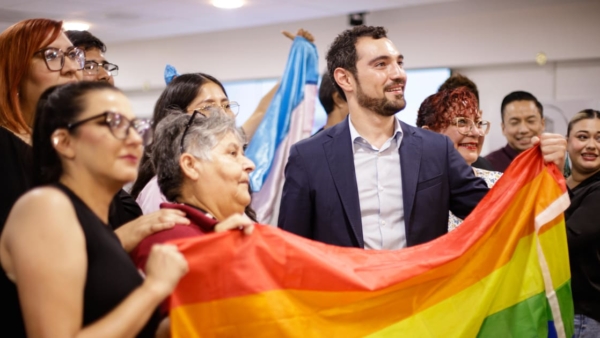
What’s the Future of HIV Criminalization Activism? An Interview With Trevor Hoppe
December 12, 2017
After 30-plus years of states using laws to criminalize people living with HIV for exposure or transmission, the movement to change these laws has gained momentum. TheBody.com’s senior editor, Kenyon Farrow, sat down with Trevor Hoppe, Ph.D., an assistant professor of sociology at the University at Albany, State University of New York (SUNY), to discuss the history and present-day activism detailed in his new book, Punishing Disease: HIV and the Criminalization of Sickness (University of California Press, 2017).
Kenyon Farrow: Part of what I want to talk about is the kind of current activism movement that is beginning to emerge to take on these laws — some federal attempts and some state-level organizing. I think the dominant framework here is that the Ryan White Care Act is the reason why we have state laws criminalizing HIV, in that the first iteration of the bill told states that they had to have these laws on the books in order to get the money.
Trevor Hoppe: To certify, yeah.
KF: Right. But what you’re suggesting is, actually, these laws were already pretty well established by the time we even got to the Ryan White CARE Act for that to even have been the case.
TH: Yeah. You know, this is really a problem with the legal literature — where you can just sort of say anything and claim that it’s true. And so, we’ve had legal scholars making this argument without any evidence for decades now, where they just say, “Oh, it must have been the Ryan White Act.”
But Ryan White was in the 1990s and, by that point, almost all the states that were going to criminalize HIV had already done so. When I look at other states — such as Alaska, for example, they were debating whether to add an HIV-specific felony law. And they said, “Well, do we have to do this because of Ryan White?”
The lawmakers said: “No, no. We looked into it. All we have to do is certify that we could punish someone living with HIV under any law, whether or not it’s specific to HIV. So, no. Ryan White is not a reason to enact this law.”
So, you have lawmakers even acknowledging that Ryan White was not a factor in their decision. So, yeah. I think that’s a farce, really, that Ryan White is to blame.
KF: Got you. Yeah, so let’s talk more about the current moment. We’ve had a number of both national organizations that are taking on more of the work, either repealing or [creating] the framework of modernizing the HIV criminal codes, and then some local efforts to do so, as well. They have had a couple of recent legal successes. Well, I’ll say legal reforms — we can debate the level of whether it’s a success or a win, or some phase. So, you know, Iowa kind of being the first state, and now California and some other places are looking at reform bills.
So much of the narrative and the messaging around reforming the HIV criminal legal code is around this idea of modernization. What I hear a lot of advocates saying — and using to speak to lawmakers — is that these laws were created when we didn’t know how HIV was spread and there was a lot of panic and fear in the country. Now that we know that people who are on treatment and get to be undetectable can’t transmit the virus, then a number of other things that we understand about treatment and disease progression, and what have you — these are reasons why we need to reform the laws.
I’m curious to hear your take on the current moment. There’s more energy and focus on criminalization laws where HIV is concerned, and particularly this sort of modernization framework. How do you respond to it, based on your research?
TH: I guess what immediately comes to mind is: Who do you think is being punished under these laws? Do you think it’s really the middle class gay man living in San Francisco who’s being arrested? No. It’s the poor white woman living in the middle of Michigan: The people who are least likely to be on treatment and have access to treatment are being caught up in this wave of criminalization.
So, I am very wary of attempts to just tweak these laws — to only punish people, for example, who have detectable viral loads — because I think that’s really just kicking the can down the road. It avoids the hard question, which is: Is the criminal justice system the best tool, the right tool, the appropriate tool, to respond to these cases? Or are there public health interventions that might be better suited to respond to these individuals, who may not be disclosing their status or, you know, may be accused, at least, of doing so.
I really think that we have two possibilities emerging. We have states like California and Colorado, who have fully repealed several of their HIV-specific felony laws. Those were huge successes, I think. They were repealed, and that’s rare. Lawmakers do not like to repeal criminal statutes because they’re worried about looking soft on crime.
On the other hand, we have states like Iowa and Tennessee, in the Midwest and the South — which is really the hotbed of criminalization in the U.S. We see there that state legislatures are moving to expand their laws to include other diseases. Now, in Iowa, they also reduce the penalties in the most harmless cases to much lower levels. And that is a success. But I think the expansion to other diseases is a huge failure, in the sense that all you’re doing there is just further entrenching the idea that the criminal justice system is the right tool to handle these situations.
I think that’s wrong. I hope we don’t see more Iowas and Tennessees out there. I hope we see more Californias and Colorados.
KF: Thank you. I got into a lot of trouble for saying that a few years back.
TH: I get [it]. I understand; I know some of those activists on the ground in Iowa. I understand that they really felt like that was the best outcome that they could achieve in that political moment. So, I understand the political realities are challenging. That’s going to be true in all of the states where criminalization is most extreme. It’s really not the Californias and New Yorks of the world where we’re locking up dozens or hundreds of people living with HIV; it’s the Michigans and the Floridas and the Missouris of the country [where] we’re seeing those outcomes.
Getting a bill, a repeal bill, passed in Michigan and Florida –that’s a different beast altogether. So, I get why Iowa activists celebrated that move. I just think it’s ultimately shortsighted. But, for people like Nick Rhoades, who was convicted under Iowa statute and had that conviction tossed out after that reform, obviously, it was a huge victory.
But it’s a question to see who are going to be the future Nick Rhoades of the world under the new law. We don’t know that yet. But I would suspect there will be more cases down the road, rather than less cases, under this new law.
KF: In closing, I would just like to hear: Where do you think we should be going in terms of the legislative strategy, in terms of the legal change, and eradicating criminalization. But I’m also curious what you think [about] aspects of either public health, community-based programs for HIV or LGBT folks, or in poor communities or what have you.
One of my concerns is that, for instance, when Michael Johnson’s trial was happening, and I, with some other folks, were doing some of the advocacy to try to support his case, one of the things I became painfully aware of was [that] there was by no means a consensus among people living with HIV, among LGBT folks, among black folks that these laws are a bad idea. To me, it actually suggests that there is some other work that we have to do, in addition to the small set of people who are going to be doing the sort of legal advocacy piece.
TH: You know, I talk to a lot of people on the ground in different states. Their first reaction is always: “What can we do? How can we get involved?”
I think sometimes it’s great that there’s this excitement and energy and interest in reforming the laws. But the reality is that the first step is not to run to the Lansings or to the Raleighs of the world — not to the state capitals — [but] to start local. That will always be the first step: to see what you can really achieve at the local level.
Talk to the local health department and see where are they on this issue. Because we may think that they’re all on board. But I can just say from my experience traveling around the country, that’s not the case in a lot of places. Local health officials are really mixed as to what the appropriate response is to these cases.
We can [do] outreach to local health officials. We can also [do] outreach to prosecutors and judges, because they’re not medical experts. They have no training in HIV science. So, when someone comes before their court — a partner, for example, comes before the court — and testifies that they have to be tested for the next 10 years to know whether they were actually infected by this person, it goes unquestioned. Because [these officials] have no expertise or knowledge.
So, I think just starting a basic communication campaign, that if these individuals are going to be tasked with litigating HIV, they ought to be informed, at the very least. And I think once you’re informed, it’s hard to come to the same kinds of conclusions in these cases if you have the science at hand. There are gross exaggerations made about HIV — that it’s a death sentence, that these defendants are murderers, that you have to be tested for 10 years to know whether you were infected — and those kinds of claims have no factual basis. And so, I think we can [do] outreach to prosecutors and judges at the local level, quietly, behind the scenes, to see what we can achieve there.
I know people want to just get up and go to the state capital. I think in some cases that’s appropriate. But, before we get there, I think, start local. It’s really at the local level that these cases play out. I think we can have potentially more success in some states, very conservative states, at the very least, by starting local.
KF: OK, great. Thank you. Is there anything else that we didn’t get to talk about that you would like to mention before we go?
TH: Well, I would say — and I say this every time I get asked this question — I think, as a gay man, I know that many of us, our community, struggles with HIV. And many of us have had the experience of finding out that someone we had sex with is living with HIV. And maybe we didn’t know it. And maybe we didn’t ask, or whatever. But we have a lot of mixed emotions about those cases. It’s something that we have to deal with as gay men; that’s a reality that many of us are going to test positive at some point in our lives.
I would just say to keep an open mind, thinking about these criminal cases. Because most defendants are not that boogeyman that you have in your imagination — the man lurking in the shadows [who] is going to intentionally, maliciously infect you. That is really almost never whom the defendant resembles. It’s much more likely to be someone who used a condom, or had an undetectable viral load, or just couldn’t figure out, for a one-time sexual encounter, how to disclose their status in a very high-stigma environment.
So, yeah. That’s all I would say, is just keep an open mind. Know that the boogeyman is really not representative of most defendants in these cases.
This transcript has been lightly edited for clarity.
Kenyon Farrow is the senior editor of TheBody.com and TheBodyPRO.com.
Follow Kenyon on Twitter: @kenyonfarrow.









